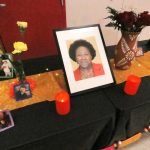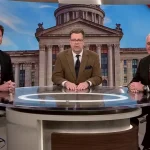Menlo College launched a new Latino Leadership Program aimed at developing culturally competent leaders who can strengthen democratic institutions and contribute to the civic health of their communities.
The initiative, announced on Sept. 18 during National Hispanic Heritage Month (which runs from Sept, 15 to Oct. 15,) will combine classroom learning, mentorship and community engagement to prepare students for leadership roles both within and beyond Latino communities. While the program was inspired by the need to expand pathways for Latino leadership, it will be open to students of all backgrounds.
“Latinos represent nearly 40% of California’s population but remain significantly underrepresented in positions of political and executive leadership nationwide,” said Melissa Michelson, Menlo College’s dean of arts and sciences. “Menlo College is committed to addressing this gap by preparing our students — Latino and non-Latino alike — to become leaders who will shape the future of their communities and beyond.”
The first group of students is expected to graduate in 2027, the same year as Menlo College’s centennial celebration.
Michelson said the program, which is expected to be approved as an official minor by January, will combine coursework with co-curricular experiences such as field trips, campus speakers and volunteer work. Students will begin participating this semester, with at least one field trip and guest speaker already planned.
Menlo College hopes to give students the opportunity to speak with leaders such as U.S. Sen. Alex Padilla, Chief Justice of the California Supreme Court Patricia Guerrero and state Superintendent of Public Instruction Tony Thurmond.
The minor will include courses such as Latino literature, Latino politics and classes in leadership theory and ethics. Students will also complete a capstone course that requires them to volunteer 40 hours during a semester at local civic organizations, nonprofits or businesses.
The central goal of the program is to help students understand what it means to lead effectively in multicultural contexts. Michelson said the concept of “cultural competency” is critical to leadership in California and beyond.
“You can’t expect somebody to just show up in a Latino community and know how to engage in community organizing or run for office if they didn’t know about that community,” she said. “In order to lead a community, you have to know that community. You have to know things about Latinos and Latino culture and the history. You have to have knowledge of Cesar Chavez and Dolores Huerta. You have to know about Diego Rivera.”
Michelson emphasized that the program is designed for all students, not just those who identify as Latino. “While we are an (Hispanic-Serving Institution), this is not just for our Latino students,” she said. “This is for everyone.”
The program also focuses on helping students identify their own leadership styles. “There are many different ways to be a leader,” Michelson said. “The classes are more about, ‘Here are the different ways that people can be leaders. Here are ethical issues that might come up. Here’s some history of some really successful leaders.’ And then once you’ve learned the academic part, the end goal is getting students out into the community.”
Michelson said the idea for the Latino Leadership Program came after learning about the Black Honors College at Sacramento State University, which combines academics with community engagement.
“I thought, ‘What a great program. I wonder if we could do something like that here at Menlo for our students,’ but maybe with a different focus, given that we’re an HSI,” she said.
Menlo College was designated a Hispanic-Serving Institution in 2019, and Latino students now make up 41% of the student body, 13% above the national average for colleges.
Some recent federal changes have led colleges to scale back diversity programs, but Michelson said while Menlo is proceeding carefully without compromising its values. “We don’t want to do anything that the federal government might find troubling or illegal,” she said. “But we’re also supporting our students who have been personally affected by anti-Latino policies. We’re not backing away from that.”
The Latino Leadership Program is supported in part by a matching gift from a Menlo College donor, and the school is continuing to raise funds to expand opportunities for students.
“We are still raising money,” Michelson said. “The program is being funded in large part by a matching gift from a friend of Menlo, and we are working hard to match that pledge so that we have enough money to do everything we want to do.”
Learn more about the program and supporting it at menlo.edu/degree/latino-leadership-program/.











